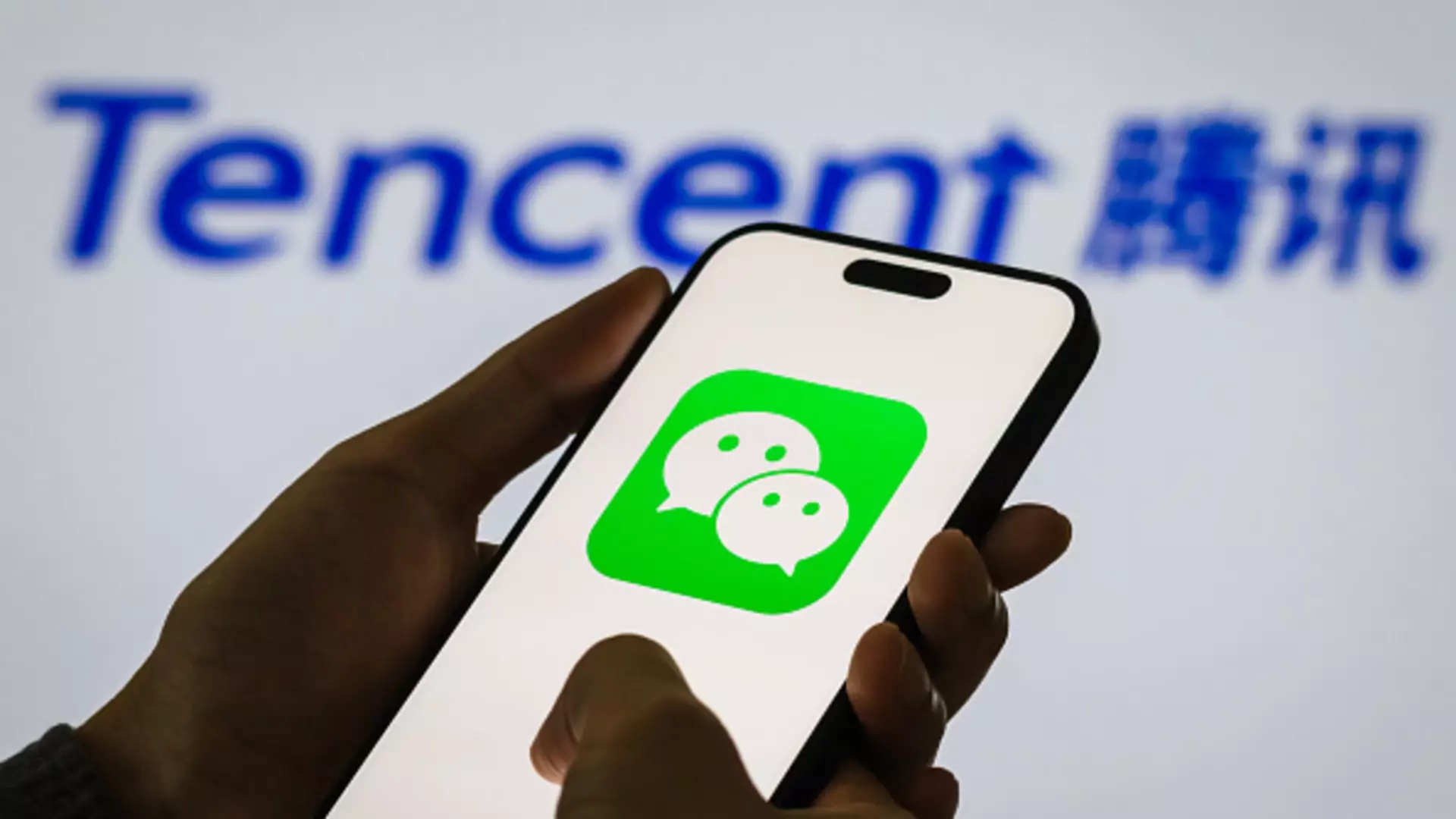Tencent’s recent financial results are nothing short of striking, with their fourth-quarter performance showcasing a remarkable increase in both revenue and profits. The numbers speak volumes: a revenue of 172.4 billion Chinese yuan ($23.9 billion) and a profit spike of 90% year-on-year. Tencent, traditionally celebrated as one of the giants of the gaming industry, has now calibrated its sights on the burgeoning artificial intelligence (AI) space—a move that is both visionary and potentially perilous. The spotlight is undeniably on Tencent, yet the question remains: are they steering the ship towards solid ground, or are they courting turbulence in a tempestuous sea?
The Overwhelming Emphasis on AI
Tencent’s strategy involved tripling its capital expenditure to a staggering 76.8 billion yuan as they aggressively invest in AI development. While this can be lauded as forward-thinking, it flips open a can of worms regarding sustainability. The sheer scale of investment raises concerns about the company’s capacity to maintain competitiveness without sidelining core gaming revenues. Yes, AI can potentially drive immense growth in sectors like cloud computing, but dependence on such a nascent technology carries inherent risks.
Their AI-centric approach has resulted in a proliferation of models, including the recently launched Hunyuan3D-2.0, which aims to transform text and images into vivid 3D graphics. But can we pause for a moment and ask whether the overwhelming focus on AI might dilute the gaming experience that has earned Tencent its formidable reputation? Users flocked to Tencent for immersive games like Honour of Kings, and there’s a prevailing sentiment that extensive shifts toward AI could alienate the very base that has lifted the company to its towering heights.
Questions of Quality Versus Quantity
Tencent’s surge into AI can be equated with throwing spaghetti at the wall to see what sticks. Though the company reported growth in its domestic gaming sector—23% to 33.2 billion yuan year-on-year—one cannot ignore that this “hike” comes from a low base last year. The problem of sustainability looms large. Continuous investment in AI without a clear monetization strategy raises uncomfortable questions about the quality of their gaming content. The dilution of resources could lead to a lack of innovation in their established gaming franchises.
Tencent is clearly aware of the risks posed by competition from other tech titans like Alibaba and Baidu. To stay afloat in this hyper-competitive environment, the company must take calculated risks. However, as it diversifies its portfolio toward AI, will it do so at the expense of the content quality that made it a household name? It’s a precarious balancing act that they must navigate with newfound caution.
The Advertising Gambit: Hopes and Hurdles
Tencent’s marketing services, their foray into the advertising realm, reported a healthy 17% growth to 35 billion yuan. However, one must look beneath the surface: this growth has been buoyed by the enhanced capabilities of its newly minted AI systems. It raises a significant question about the long-term viability of this revenue source. Will the advertising boom be sustainable, or is it merely a flash in the pan fueled by transient consumer trends?
The appetite for quality advertising based on AI appears to be a double-edged sword. Advertisers are demanding increasingly sophisticated targeting systems, pushing Tencent to innovate rapidly. The company’s ability to meet these demands could dictate its standing in the advertising landscape. One must remain skeptical: If Tencent places an over-reliance on these AI-driven strategies, will it lead to a market saturated with less relevant ads, ultimately driving users away?
Consumer-Centric AI: A Cause for Caution
Tencent has deployed its Yuanbao AI chatbot and made strides to integrate DeepSeek technology to improve WeChat’s search features. The company claims strong growth in Weixin’s search revenue, which nearly doubled year-on-year. This is certainly impressive; however, the real question is how this newfound technology will be perceived by consumers. Users demand more than mere functionality—they seek engaging, intuitive experiences. If Tencent’s AI implementations fall short of these expectations, they risk massive backlash from a user base that has grown accustomed to richness in experience.
Indeed, consumer skepticism can stifle newfound innovations and tarnish impressive financial statistics. Rollercoaster sentiment could translate to fluctuating user engagement and, consequently, diminished revenue—a costly outcome for any organization banking on AI as the linchpin of future profits.
Competition: The Stark Realities of AI Rivalry
Tencent’s aggressive pivot toward AI is unmistakably shaped by a frenzied competitive landscape dominated by rivals such as Alibaba and Baidu. While competition can drive innovation, it also raises the stakes. The rush among tech companies to release their own AI capabilities could lead to market oversaturation. This prompts a fundamental query: how will Tencent carve out a distinct identity in a field where everyone is vying to be the leader?
Their current advancements may position them well, yet the race is far from over. The very collaboration with startups like DeepSeek, which is considered a formidable player, introduces complexities. While partnerships may enhance capabilities, they run the risk of diluting Tencent’s unique brand story.
In short, Tencent is navigating a treacherous landscape, oscillating between opportunities and vulnerabilities. The stakes couldn’t be higher; the company must tread carefully to capitalize on its innovations without losing the essence that has brought it this far.

